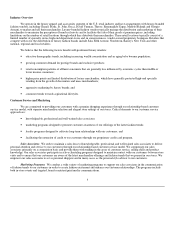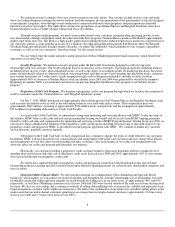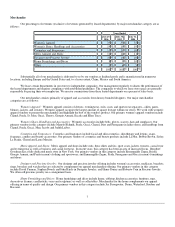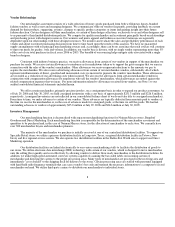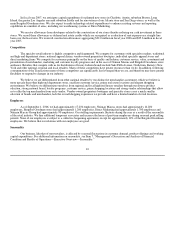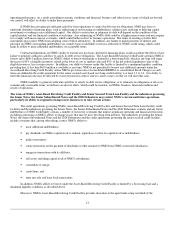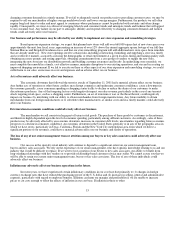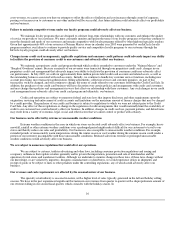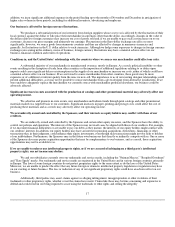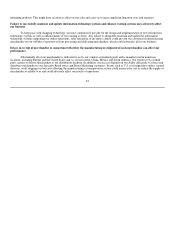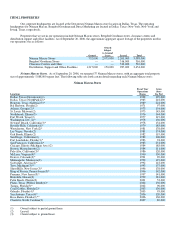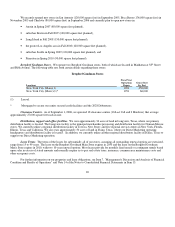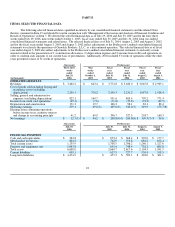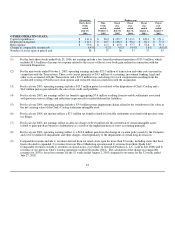Neiman Marcus 2005 Annual Report Download - page 18
Download and view the complete annual report
Please find page 18 of the 2005 Neiman Marcus annual report below. You can navigate through the pages in the report by either clicking on the pages listed below, or by using the keyword search tool below to find specific information within the annual report.
changing consumer demands in a timely manner. If we fail to adequately match our product mix to prevailing customer tastes, we may be
required to sell our merchandise at higher average markdown levels and lower average margins. Furthermore, the products we sell often
require long lead times to order and must appeal to consumers whose preferences cannot be predicted with certainty and often change
rapidly. Consequently, we must stay abreast of emerging lifestyle and consumer trends and anticipate trends and fashions that will appeal
to our consumer base. Any failure on our part to anticipate, identify and respond effectively to changing consumer demands and fashion
trends could adversely affect our business.
Our business and performance may be affected by our ability to implement our store expansion and remodeling strategies.
Based upon our expansion strategy, we expect that planned new stores will add over 660,000 square feet of new store space over
approximately the next four fiscal years, representing an increase of over 12% above the current aggregate square footage of our full-line
Neiman Marcus and Bergdorf Goodman stores, and that our store remodeling program will add additional new store space from remodels
that are already underway. New store openings involve certain risks, including constructing, furnishing and supplying a store in a timely
and cost effective manner, accurately assessing the demographic or retail environment at a given location, hiring and training quality staff,
obtaining necessary permits and zoning approvals, obtaining commitments from a core group of vendors to supply the new store,
integrating the new store into our distribution network and building customer awareness and loyalty. In undertaking store remodels, we
must complete the remodel in a timely, cost effective manner, minimize disruptions to our existing operations, and succeed in creating an
improved shopping environment. If we fail to execute on these or other aspects of our store expansion and remodeling strategy, we could
suffer harm to our sales, an increase in costs and expenses and an adverse effect on our business.
Acts of terrorism could adversely affect our business.
The economic downturn that followed the terrorist attacks of September 11, 2001 had a material adverse effect on our business.
Any further acts of terrorism or other future conflicts may disrupt commerce and undermine consumer confidence, cause a downturn in
the economy generally, cause consumer spending or shopping center traffic to decline or reduce the desire of our customers to make
discretionary purchases. Any of the foregoing factors could negatively impact our sales revenue, particularly in the case of any terrorist
attack targeting retail space, such as a shopping center. Furthermore, an act of terrorism or war, or the threat thereof, could negatively
impact our business by interfering with our ability to obtain merchandise from foreign manufacturers. Any future inability to obtain
merchandise from our foreign manufacturers or to substitute other manufacturers, at similar costs and in a timely manner, could adversely
affect our business.
Deterioration in economic conditions could adversely affect our business.
The merchandise we sell consists in large part of luxury retail goods. The purchase of these goods by customers is discretionary,
and therefore highly dependent upon the level of consumer spending, particularly among affluent customers. Accordingly, sales of these
products may be adversely affected by an economic downturn, increases in consumer debt levels, uncertainties regarding future economic
prospects or a decline in consumer confidence. An economic downturn in the United States generally or in any of the geographic areas in
which we have stores, particularly in Texas, California, Florida and the New York City metropolitan area, from which we derive a
significant portion of our revenues, could have a material adverse effect on our business and results of operations.
The loss of any of our senior management team or attrition among our buyers or key sales associates could adversely affect our
business.
Our success in the specialty retail industry will continue to depend to a significant extent on our senior management team,
buyers and key sales associates. We rely on the experience of our senior management, who have specific knowledge relating to us and our
industry that would be difficult to replace. If we were to lose a portion of our buyers or key sales associates, our ability to benefit from
long-standing relationships with key vendors or to provide relationship-based customer service may suffer. We cannot assure you that we
will be able to retain our current senior management team, buyers or key sales associates. The loss of any of these individuals could
adversely affect our business.
Inflation may adversely affect our business operations in the future.
In recent years, we have experienced certain inflationary conditions in our cost base due primarily to (1) changes in foreign
currency exchange rates that have reduced the purchasing power of the U.S. dollar and (2) increases in selling, general and administrative
expenses, particularly with regard to employee benefits. Inflation can harm our margins and profitability if we are unable to increase
prices or cut costs enough to offset the effects of inflation in our cost base. If inflation in these or other
15


